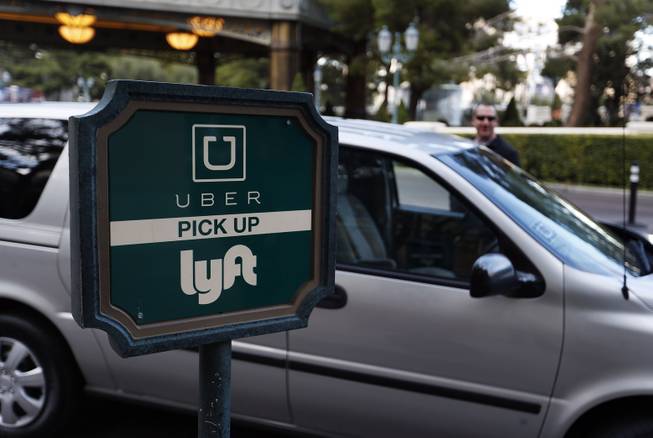
John Locher / AP
In this Jan. 14, 2016, photo, a driver waits to pick up passengers at an Uber and Lyft pickup area at the Bellagio in Las Vegas.
Monday, Sept. 19, 2016 | 2 a.m.
Even after state regulators gave Uber and Lyft the go-ahead to operate in Las Vegas last September, the Silicon Valley startups quickly became a frustration for local politicians, who were disturbed by the firms’ resistance to local fees. The taxi industry, too, was less than thrilled about having competitors operate under different rules.
In the year since, that public hostility has receded and even Uber and Lyft’s most ardent challengers at the time concede that the companies, whose services allow passengers to hail rides from a mobile app, have had a substantial impact on the Las Vegas transportation market.
Consider these numbers: Uber has completed more than 1 million rides at McCarran International Airport since last year. Statewide, Uber boasts about 11,000 drivers, eclipsing the number of cab drivers in Clark County. And in just one year, the company claims to have amassed about 882,000 active riders in the state, equivalent to about a third of Nevada’s population.
Lyft’s growth in Nevada has been similar. “It’s been nothing but progress,” said Yacob Girma, Lyft’s general manager in Nevada. “In the last six months alone, we’ve more than tripled our rides.”
Uber and Lyft have brought new revenue to the county, which charges licensing fees for each driver and a small fee for every airport ride. The latter fee has generated more than $3 million for the airport.
“The growth is amazing,” Clark County Commission Chairman Steve Sisolak said at a commission meeting this month, after seeing the breakdown of Uber and Lyft’s operations at the airport.
And the companies have built up goodwill by integrating themselves within the community, partnering with businesses and organizations that address issues including sexual assault and drunken driving.
This is not how things began.
Both companies, which launched Sept. 15, 2015, defied warnings from county officials who asked the companies to remain inactive until a framework for licensing them had been created. Launching without the county’s blessing sparked a monthslong skirmish over licensing and fees.
That’s over now. The county eventually set up a licensing process for the companies and its drivers, who are independent contractors. It applies to all companies that conduct app-based delivery, including Postmates and GrubHub, which use independent contractors to deliver takeout from restaurants.
Since Uber and Lyft started operations, the county’s licensing department said it had received no complaints. State regulators, who oversee the day-to-day operations, said officers have received one public complaint about a high fare and have issued about 30 citations to drivers working without permission.
“I’ve not been made aware of any ongoing problems,” Sisolak said.
The only negative feedback Sisolak had heard came from the taxi industry’s complaints that Uber and Lyft have drawn away business, and from drivers frustrated that they were not making as much money as promised.
Crystal Johnson, an Uber driver who has lived in Las Vegas for two decades, said she uses Uber to supplement her income, allowing her to spend money on extracurricular activities for her children. But she also said there are challenges to the job. Difficult passengers, for instance, can be frustrating if they give their drivers a low rating, which can eventually lead to deactivation.
“Overall, it’s been positive,” Johnson said. “Some people are just cranky for no reason. I’d probably say that’s one of the biggest challenges.”
In public, the taxi industry hasn’t loudly criticized ride-hailing. Its trade group, the Livery Operators Association of Las Vegas, declined to comment for this story. The silence, though, does not mean embattled taxi companies won’t try to push new regulations for ride-hailing. In July, The Sunday reported that there is interest in requiring ride-hailing companies to screen drivers using FBI background checks.
Such regulations have prompted Uber and Lyft to cease operations elsewhere. Ride-hailing firms argue that their pre-employment background checks are as robust as the costlier FBI checks.
For now, ride-hailing continues to grow in Las Vegas. And Uber, which launched a food-delivery service this month, is exploring ways to broaden its services. In other markets, Uber and Lyft offer a carpooling service for passengers to share the cost of a ride to similar locations.
“The response from both riders and drivers has been overwhelmingly positive,” said Eric Wimer, Uber’s general manager in Nevada. “We’ve had tremendous growth in the past year, not only at the airport and the Strip but also in the outstretched suburbs.”

Join the Discussion:
Check this out for a full explanation of our conversion to the LiveFyre commenting system and instructions on how to sign up for an account.
Full comments policy